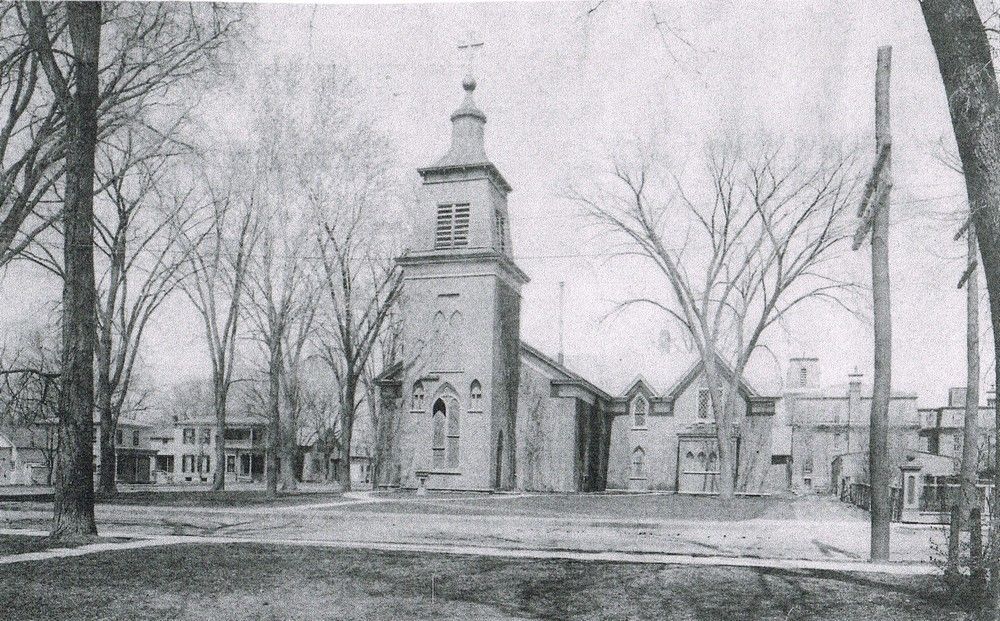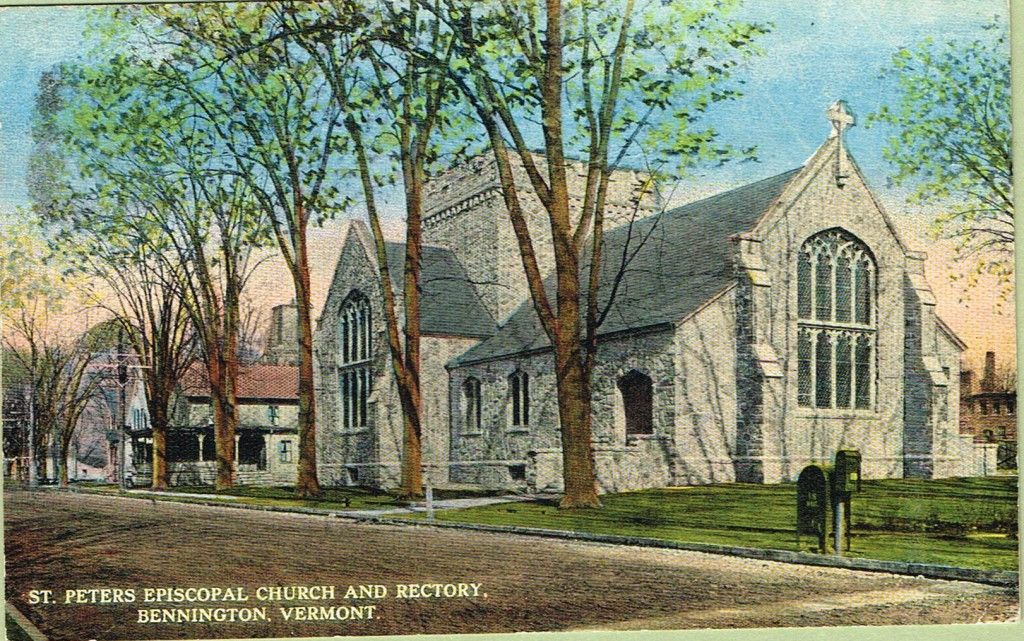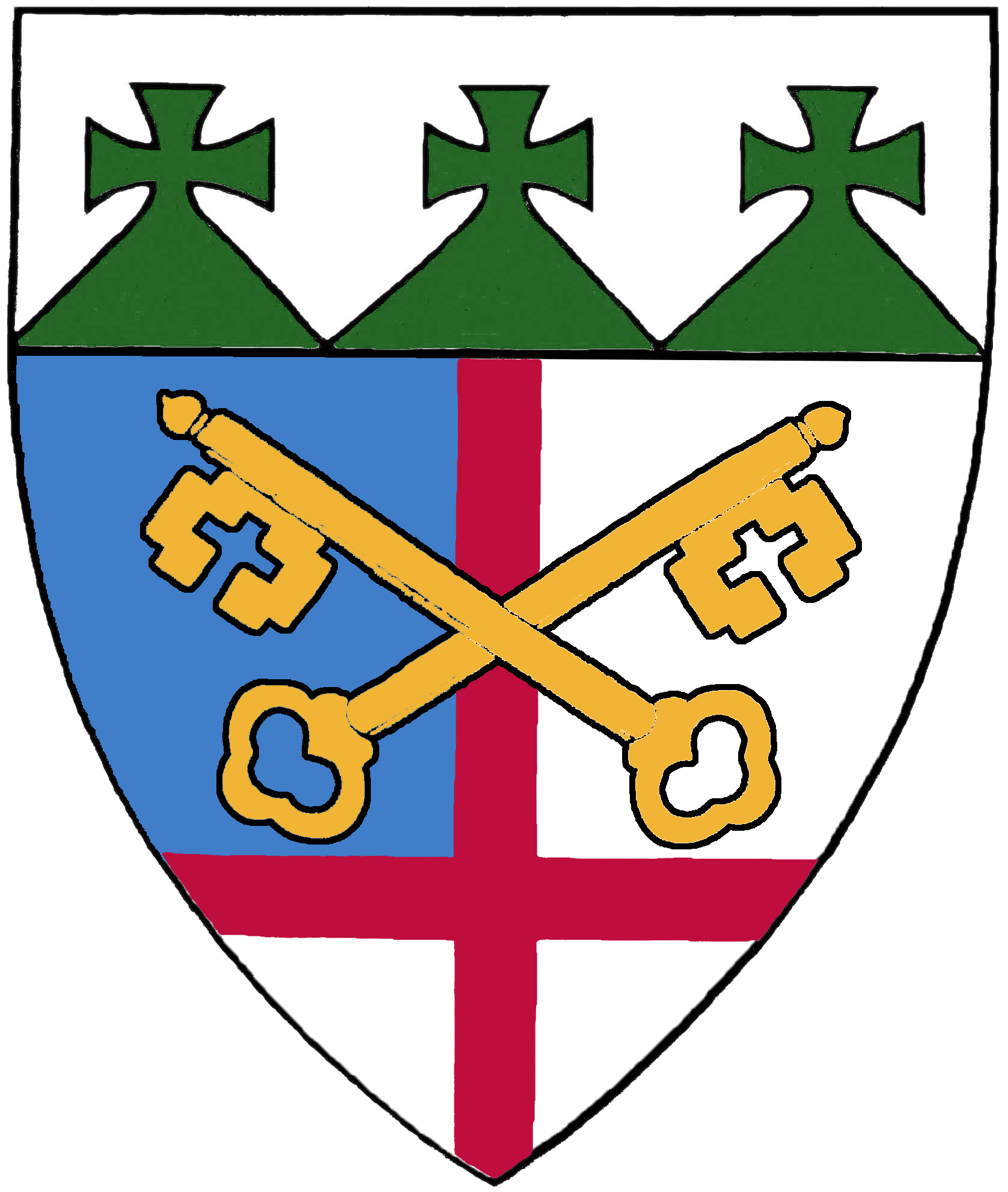History of St. Peter's
1959-1967
The Rev. Frederick B. Wolf was called to be Rector of St. Peter’s. Father Wolf served until 1967 when he was called to be Bishop of Maine. This was a period of national resurgence in church attendance, and St. Peter’s was alive with activity. There were three services each Sunday, multiple educational offerings, two choirs – adult and children – a full staff, including a full-time associate rector, a director of Christian Education, a secretary, sexton, and a part-time organist-choir director. The congregation was a generation younger than it is now, with a larger middle-age group.
1967 – 1972
The Reverend Edward Geyer, a black priest from an inner-city ministry, was called to succeed Father Wolf. The Parish called the priest best qualified and suited to the parish without regard to race. Father Geyer is remembered as highly intelligent and very able in his ministry. This was an era of unsettled conditions in our country: the Vietnam War, Watergate, the Women’s Movement, the “ME” generation, general distrust of authority, and other issues. Add to those concerns, the proposals for revision of the 1928 Prayer Book, and the stage is set for the decline in church attendance and subsequent anxious situations. Father Geyer selected the Rev. Edward Patrick to be associate rector when the previous associate resigned. Father Patrick was warmly received. But despite the good intentions of both men, parish loyalties became divided. Father Geyer resigned to accept a call elsewhere, and Father Patrick also resigned to ease the friction, thus enabling the parish to search for a priest who could draw the parish together again.

Slide title
Write your caption hereButton
Slide title
Write your caption hereButton
1972-1973
During this period of self study and searching for a new rector, several priests provided pastoral and sacramental care for the parish. The Rev. Larry Sherwin and the Rev. John Morris were two of the supply priests during this time.
1973 – 1991
The Reverend Kenneth W. Costin was called to be Rector in 1973. Father Costin served 18 years, to the age of mandatory retirement. Father Costin came to St. Peter’s in mid-life, of an age with many in the congregation. He has been characterized as a healing person in a time that called for healing, as a person who could help others to reconcile in a time for reconciliation. During Father Costin’s tenure, many of the responsibilities of the parish were undertaken. Church buildings and equipment were put in good repair – insulation added, stonework repointed, roofing renewed, the pipe organ rebuilt, an accessible entrance ramp built, a new sound system installed.
The smaller rectory, which had not been used as a rectory since Father Patrick’s leaving, was sold, and later the brick rectory was sold and a housing allowance provided so that the rector could benefit from investment in a house of his own. The Parish became very comfortable with a strong leader like Father Costin. However, the parish became rather unresponsive to the obligations of the laity for participating in educational and stewardship programs and in the well-being of our fellow parishioners. Differing opinions on the new prayer book and the ordination of women could have divided the parish, but Father Costin sensitively handled both issues. St. Peter’s became accustomed to deficit budgets and from time to time the parish has borrowed substantially – but all obligations were met and in 1972 the parish was debt-free. Church attendance fell off, but much less than apparent nationally. There was much faith in the underlying soundness that Father Costin built into the parish.
1991 – 1992
Effective in May 1992, the long-standing leaders of St. Peter’s Youth Group decided to step aside and retire. David and B-Sue Wilkinson served as Youth Group Leaders for 14 years. Under their guidance, youth ministry flourished. The Vestry appointed a parish self-study and search committee to evaluate parish strengths and weaknesses, to establish goals, and to seek a priest whose ministry would be suited to St. Peter’s perceived needs. The committee recommended that an interim rector be called after Father Costin’s retirement (November 1991) to provide time for an intensive review of the character of the parish, its contemporary needs, and response to a changing world. The Rev. Dr. Driss R. Knickerbocker served as interim rector until August 1992 to prepare the parish for the transition from the much-loved and respected Father Costin to the priest who would succeed him.
1992 – 2003
In October of 1992, the Rev. Arthur Kingdon was called as Rector for St. Peter’s Parish.
Father Kingdon proved to be an able administrator as he helped the parish to remain financially secure. Father Kingdon also provided leadership to the parish in building up the ministry of the laity. He encouraged the formation of a Lay Ministry Team, which continues to be active in supplementing pastoral support. Concerns about Christian Education, ministry to young people, financial security, and the physical plant were all addressed during Father Kingdon’s tenure. A successful Capital Campaign supported the re-pointing of stonework, re-building of the pipe organ, improvement of access for people with disabilities, and the painting of the nave of the church. Many parishioners were saddened when Father Kingdon announced his plans to retire and move back to Maine. He is remembered for his ability to relate to the children of the parish as well as to the older generation.
2003 – 2005
In October 2003, the Vestry called the Rev. Canon Robert J. Miner as Interim Rector. The Vestry also appointed an 11-member Ministry Discernment Committee to lead the self-study and search process for a new permanent Rector. Father Miner has been extremely well received and has been an excellent catalyst for encouraging parishioners to think and pray about the needs of St. Peter’s. The congregation appreciated Father Miner’s wise guidance and thorough involvement in the life of the parish.
2005 – 2010
In June 2005 the Vestry called The Rev. Anita Schell-Lambert to be the twenty-sixth rector of Saint Peter’s Parish. Mother Schell-Lambert began her ministry at St. Peter’s on Sunday, August 21. Energy, vitality, refreshment, intensity, and dedication were evident in Mother Schel-lLambert’s involvement in the sacramental life of the parish, in the community of St. Peters, in the wider Bennington community, and in the Diocese of Vermont.
2010 – 2012
On July 1, 2010 the Rev. L. Paul Gratz was called as the Interim Rector and we began a process of Ministry Discernment when the Vestry appointed the Ministry Discrenment Committee. As part of the process of Discernment interested members of the Parish engaged in Conversations based upon Changing the Conversation by Anthony Robinson.
2012 – 2019
In October 2012, The Reverend Justin Lanier was called to St. Peter’s. With his wife Heather, a writer and teacher, and their daughter Fiona, the young family settled into Bennington. In May 2013 their daughter Petra was born. The family brought other young families into the St. Peter’s fold, making for some lively Christmas pageants. The parish was looking for someone to help us become more spiritual and Fr. Justin responded to that call. Fr. Justin brought his passion for prayer and love of liturgy to his new post as rector. His past explorations into spirituality which included time as a Trappist monk in Colorado and time as a Zen monk in Japan brought an Eastern influence to his spiritual life and teachings. Fr. Justin studied under Fr. Thomas Keating, one of the founders of the practice of Centering Prayer. He imparted his Centering Prayer teachings and practices to many in the Bennington Community, from all faiths and backgrounds. He formed a Sunday afternoon book group to read and discuss many books of contemplative interests, and led a Sunday afternoon Bible Study for some time. During his tenure he spearheaded the project to install solar panels on the roof of the parish hall. This green power source helped reduce the church’s electric bills and provided electric benefits to PAVE and Sunrise Resource Center. In 2017, Fr. Justin accepted an invitation from Fr. Thomas Keating, Contemplative Outreach, to become a member of the New Contempatives Exchange, a global network for contemplative studies and practice. From August 14-18, he joined twenty other “younger” contemplatives at Snowmass CO, along with the four teachers who invited them (Fr Thomas, Fr. Richard Rohr, Fr. Laurence Freeman and Rev. Dr. Tilden Edwards). These younger people were entrusted with the wisdom of their teachers’ lineages in order to nurture and advance the movement of Contemplative Prayer in the coming years. In the summer of 2019 Fr. Justin helped establish a branch of Contemplative Outreach in southern Vermont. The Lanier family left Bennington in August of 2019 when Heather accepted a teaching position at Rowan University in NJ.
2019 – 2020
From August 2019, until the shutdown of the church due to the Coronavirus in March of 2020, the Vestry brought in supply priests who provided a variety of worship and leadership styles.
March 2020 – August 2020
From March 2020 through August 2020, an important source of spiritual leadership came from John Terauds, well known to the parish from his days as music minister at St Peter’s. As John completed his seminarian studies he returned to Bennington. He organized Sunday prayer walks when we had no other way to gather together. He then worked with the people of St. Peter’s to set up Morning Prayer services online. John also worked as St Peter’s Community Missioner from July 2020 to February 2021.
July 2020 – September 2021
From July 2020 through September 2021, The Reverend Angela Emerson came to St. Peter’s as our part-time Interim Priest. She taught us to rely on our own efforts to continue St Peter’s mission including creating “Building Block” teams for parish management, training of a Laity Worship team, setting up our outdoor Pause Place to gather prayers from the community, and immediately brought consolation to the grieving family of a young woman killed on the river walkway. Rev Angie set up the Walloomsac River Walkway monthly walks and efforts to create a safer neighborhood and way to interact with neighbors. Her energy and enthusiasm motivated the parish. These walks continue and are hosted by the Greater Bennington Interfaith Council.
CONTACT US
200 Pleasant St., Bennington, VT, 05201
Phone: (802) 442-2911
Email: [email protected]
The parish office is open
Monday - Friday: 9a to 12noon
St Peter's Episcopal Church is a parish of the Episcopal Diocese of Vermont and the Episcopal Church.

